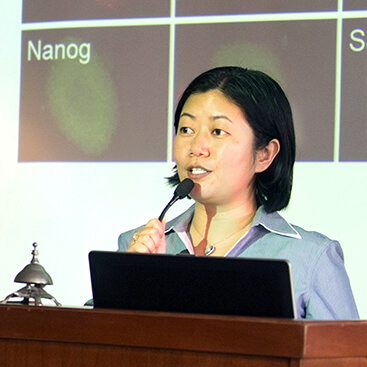- July 22, 2014
- By Karen Shih ’09
At age 17, Sam Berns devoured comic books, played drums in the marching band and cheered for his favorite Boston teams. Sounds typical, right? But unlike his classmates, Sam was bald, physically fragile and weighed an alarming 50 pounds.
All are hallmarks of the premature aging disorder called progeria. Within the first year or two of their lives, children with this genetic condition start to lose body fat and hair. Their joints become stiff and stop growing at a normal rate. As they get older, their bones become brittle, and they usually don’t live past age 13.
It’s an extremely rare disease—the Progeria Research Foundation (PRF) lists just 114 known patients around the world—but has drawn more attention in recent years as children like Sam have shared their stories with the public. He starred in the HBO documentary “Life According to Sam” and gave a TedX talk just months before he died in January.
 Why children with progeria usually die of heart failure and stroke—problems much more closely associated with senior citizens—has been a mystery, one that Kan Cao, assistant professor of cell biology and molecular genetics at Maryland, and her team have recently taken an important step toward solving.
Why children with progeria usually die of heart failure and stroke—problems much more closely associated with senior citizens—has been a mystery, one that Kan Cao, assistant professor of cell biology and molecular genetics at Maryland, and her team have recently taken an important step toward solving.
Progeria is caused by a genetic mutation that causes the child’s cells to produce progerin, a toxic form of a protein that usually forms the skeleton of the nuclear membrane.
The question is, “Why can this mutation cause this disease?” Cao says. Understanding how progerin weakens the body—the toxic protein is found in small quantities in healthy people as well, but builds in the cells of older people—could also lead to better understanding of human aging in general.
Cao’s latest findings, first reported in Proceedings of the National Academy of Sciences, involve the smooth muscle cells that line many internal organs, including blood vessels. She and her team found that those in progeria patients don’t divide and reproduce like regular cells. After just two weeks, half of the patients’ cells were dying because they weren’t able to repair themselves. This loss of smooth muscle tissue may be what makes the arteries weak and patients prone to heart failure or strokes.
“Dr. Cao is a pivotal researcher in the field of progeria,” says Dr. Leslie Gordon, Sam’s mother and co-founder and medical director of PRF. “Her interest goes straight to understanding the core problems of the disease, and to using that understanding in order to discover new treatments to help the children.”
Cao admits to feeling “a lot of pressure,” especially since she’s befriended some patients through her work, but she keeps her focus on the science.
“The hope is to cure them one day soon,” she says. “But everybody in the field, we have to work together.”
Tags
Research